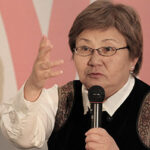Roza Otunbayeva, President of Kyrgyz Republic (2010-2011) and Club de Madrid Member, was involved in two panel discussions on 1st and 2nd February during the United Nations Commission on Social Development, part of a joint initiative of the Club de Madrid and the UN Division for Social Policy and Development.
President Otunbayeva was joined on both panels by Daniela Bas, Director of the Division for Social Policy and Development for the UN´s Department of Economic and Social Affairs and Clem McCartney, Coordinator of Club de Madrid’s Shared Societies Project. She also met with the President of the United Nations General Assembly, Peter Thomson, in addition to several UN officials.
The first discussion, entitled “The Role of a Shared Society as a Strategy to Reduce Poverty”, included analysis of current anti-poverty programs and proposals for future eradication efforts. The panel emphasized the importance of understanding the specific economic, social, and geographical barriers that have hindered development efforts in order to improve current programs, and in particular the link between social exclusion and poverty. Panel members proposed steps that governments and non-state actors could take to more effectively fight underlying causes of poverty, reduce inequality, and realize the goals of the 2030 Agenda. In accordance with Club de Madrid’s Shared Societies framework, specific emphasis was put dealing with social exclusion and building societies in which everyone is a full and active participant.
The second discussion of the initiative, for which UN Women was also a co-host, was entitled “Woman Agents of Change in Building Shared Societies”, and looked at the role of women in current efforts to implement sustainable development and peace. Members outlined institutional disadvantages that women face, along with specific strengths that female workers bring to the peace building process. The panel reviewed the findings of a Club de Madrid Working Group on Women and Shared Societies, and discussed how these recommendations could be adopted by and assist UN bodies, civil society, and Member States in their work to implement Sustainable Development Goals.
President Otunbayeva met the UN officials: Thomas Gass, Assistant Secretary-General for Policy Coordination and Inter-Agency Affairs, Stephen Jackson, Chief of Policy Planning and Guidance for the UN Department of Political Affairs, David Nabarro, Special Adviser to the United Nations Secretary-General on the 2030 Agenda for Sustainable Development and Jamil Ahmad, New York Deputy Director of the UN Environment Programme.
